- Home
- Anne Zouroudi
The Doctor of Thessaly Page 10
The Doctor of Thessaly Read online
Page 10
‘Kali mera,’ said the fat man. ‘I’ll take two from you.’
‘Here you are, kyrie, here you are.’ Lowering the pole, the vendor stood it on the ground to allow the fat man his choice. ‘Take your time, you know, take your time. I’ve a feeling you’re going to be lucky. I can always tell winners, you know, I can always tell. So choose two lucky ones, kyrie. You’ve a lucky face, you have. Take your time, and choose two lucky ones.’
But the fat man made his choices quickly, taking one ticket from the top of the pole and one from the middle before handing over his payment.
‘Both lucky ones, they are,’ said the vendor, ‘both lucky ones.’
‘Do you think so?’ said the fat man, smiling. ‘Time will tell, my friend. Time will tell.’
The public library was imposing: scroll-topped Ionic pillars beneath a triangular portico, a graceful run of broad steps, two stone lions watchful on high plinths. From the far side of the avenue, the fat man stood for a moment to admire the building’s pleasing lines; then, spotting a gap in the passing traffic, he made his way across the road and up the library steps.
He passed through the revolving doors, and found the entrance lobby some degrees colder than outside, with the never-warmed chill of a cavern. A splendid chandelier hung unlit from the ceiling; on the shadowed walls, gold-framed portraits of the library’s long-dead founders faced a selection of scenes from the myths, whose colours were muted by the grime of decades.
Through swing doors, the library itself was no warmer. Bookshelves ran round the perimeter of the circular room; more shelves branched into the centre, where several tables were pushed together to form a workspace. Here, students in down jackets scribbled notes from open volumes; a man in scarf and overcoat read a newspaper. More students stood by the bookshelves, reading or searching through indexes; in the travel section, a woman flicked through an outdated guide to Tibet.
At the counter, a librarian was sticking new labels in old books. The librarian had dressed for the cold: a tank-top over a grey sweater; beneath the grey sweater, a floral-patterned shirt.
For a minute or two, the fat man waited patiently for the librarian’s attention. The librarian smoothed a label on the first page of a book, pressing down the corners with his thumb. Satisfied at last that the label was properly stuck, he closed the book, and – not, apparently, having noticed the fat man – reached out for another book from his stack.
The fat man was too quick for him; the book was in his hand before the librarian touched it.
The fat man read the title aloud.
‘Economics of the Market.’
As the librarian glared, the fat man opened the book at the inside cover and ran his eyes over its record of loans. Its readers had been few; the last loan was over two years previously.
‘Not your most popular volume,’ said the fat man. ‘Perhaps you should requisition a more recent edition. Markets, as I’m sure you’re aware, evolve. Current data is essential in the study of economics.’
‘There are no funds available for new editions of books we already have in stock,’ said the librarian, shortly. He held out his hand for the book. ‘May I help you?’
The fat man smiled.
‘Indeed you may. I’m looking for a colleague of yours – Noula Kaligi.’
‘Through the double doors, upstairs, first on the right.’
The fat man placed the book on the counter and his own hand on top of the book.
‘Before I see Miss Kaligi,’ he said, ‘there’s a book I’ve been looking for. Perhaps you could check the catalogue to see if you have a copy.’
For a long moment, the librarian regarded him.
‘Title?’ he asked, at last.
‘A Short Guide to Etiquette and Modern Manners. It was published some years ago. I’m afraid the author’s name escapes me.’
The librarian sighed. Leaving the counter, he crossed to the bank of wooden drawers which housed the catalogue. Opening a long, narrow drawer packed with yellowing index cards, his fingers riffled deftly through them, until, close to the back of the drawer, he found the title the fat man had requested. Turning the card behind it vertical to mark its place, he removed the card and read the fading ink script.
‘It seems we do have a copy,’ he said. ‘You’ll find it . . .’
‘Excellent,’ interrupted the fat man, smiling. ‘Perhaps you’d be good enough to retrieve it for me. My time here is limited, and I need to speak with Miss Kaligi. I’ll come back to you on my way out.’
Upstairs, the first door on the right bore a nameplate: Director’s Office. The fat man knocked, and a woman’s voice invited him to enter.
He stepped into a small room no warmer than the library downstairs. A well-organised desk was positioned to bar easy access to an inner office, whose door was closed. At the desk, a woman sat with her hands over a typewriter’s keyboard, a letter half finished between its rollers. The woman’s likeness to Chrissa Kaligi was clear, but her looks were more unfortunate; and as if accepting the fact of her unattractiveness, she’d made no effort at all with herself: no make-up to bring out the eyes or enhance the skin, no bleaching of the dark-haired upper lip, no dyeing or styling of the greying hair, no pretty jewellery or clothes which flattered.
The fat man smiled.
‘Kali mera sas,’ he said.
She did not return his smile, but instead looked down at a black-bound diary, open at today’s date.
‘Do you have an appointment?’ she asked.
‘Appointment?’
‘The director sees no one without an appointment. He’s a busy man, as you would expect. But he has an opening on Monday afternoon.’
‘You mistake the purpose of my visit,’ said the fat man, politely. ‘My business is not with the director. If you are Noula Kaligi, my business is with you.’
‘Me?’
‘Allow me to introduce myself. I am Hermes Diaktoros, of Athens, and I have been asked by the authorities to look into the circumstances surrounding your sister’s wedding.’
‘There was no wedding. My sister remains a spinster.’ She bent to the floor; he heard the snap of a handbag clasp, and she reappeared behind the desk, wiping her nose on a handkerchief trimmed with lace. ‘Excuse me,’ she said, ‘but from October to March, I’m a martyr to colds. They’ve made cutbacks on the heating.’
‘What a pretty handkerchief,’ said the fat man. ‘Such fine lace. Is it your own work?’
‘The only work I have time for is here. It’s my sister who’s time for hobbies and needlecraft.’ She tucked the handkerchief up the sleeve of her cardigan, out of sight. ‘I have work to do now, and I don’t know anything about Chrissa’s wedding she can’t tell you herself.’
She positioned her fingers over the typewriter’s keys, and looked down at the shorthand notes she was working from.
‘The wedding was prevented by an attack on your sister’s fiancé,’ said the fat man, ignoring her show of disinterest. ‘A vicious and malicious attack.’
With reluctance, Noula again gave him her attention.
‘We are aware of that, now. At the time it appeared that he had – well, it seemed she had been stood up.’
‘That must have been very hard for her. Such embarrassment and such disappointment! How did you cope?’
‘How did I cope? I sent the guests packing and paid for food we never ate. It was all down to me, as usual.’
The fat man gave a small shake of his head.
‘You misunderstand me,’ he said. ‘What I meant was, how did the two of you together cope? How did you comfort your sister?’
‘Comfort her? How should I comfort her when she will barely speak to me? Chrissa blames me for everything, and acts like a character from one of her silly books. She makes herself ridiculous, moping and sulking.’
She pulled out the handkerchief from her cardigan sleeve, wiped her nose once more and bent to return the handkerchief to her handbag.
‘She has suffered
a great shock, surely?’ said the fat man. ‘Any woman who has looked forward to her wedding day would feel the same. Wouldn’t she?’
‘I have not, myself, had the pleasure of looking forward to my wedding day. So how could I possibly say?’
The phone on her desk rang, and she answered it with a formal greeting; continuing to speak, she flicked through the days ahead in the director’s diary. As she made the caller’s appointment, the fat man cast his eyes around the office, noting the lack of personal touches – no photographs, no favourite china cups, no plants, no personal effects at all, except for a black woollen jacket hanging on a hat-stand behind the door. The single radiator was rusting around its pipework. The fat man touched it with the back of his hand, and found it cold.
Noula replaced the phone’s receiver, and with a newly sharpened pencil, made an entry in the diary. The fat man waited until she had finished writing before putting his next question.
‘Your sister tells me you have phoned the hospital on her behalf, for news of her fiancé. Did you pass on to her all that was said?’
She placed the pencil in a beaker containing several more, all well sharpened and of identical length.
‘My sister’s not good on the telephone, whereas I – as you may have noticed – spend half my life on it. I thought I would get more sense out of them than she would. She would run up the bill, and be no wiser at the end of it.’
The fat man smiled.
‘With respect, I didn’t ask why you made the call. I was wondering if you told your sister all that was said.’
She hesitated.
‘Not all, no.’
‘So what did you leave out?’
‘The long-term outlook.’
‘Ah. You didn’t tell her he is likely to remain blind.’
‘No.’
‘Why not?’
She looked directly into his eyes.
‘I thought it would be unnecessarily cruel. Just at the moment.’
‘So you were waiting for the right moment to break the news?’
‘I suppose so.’
‘When I asked your sister if another date had been set for the wedding, she told me Dr Chabrol won’t even see her. Is that correct?’
‘He’s no fool, is he? He’s not a pretty prospect at the moment, I’m sure; in my opinion, he wasn’t such a pretty prospect before, either.’
The fat man raised his eyebrows.
‘What do you think, that my sister landed herself some handsome, wealthy surgeon? Louis – Dr Chabrol – may have been a medical man, but he wasn’t – in my opinion – such a great catch. If he was, how come he hadn’t been snapped up before? He finished off our mother, if you ask me. Dr Dinos was always firm with her, made her get up in the mornings and keep moving, however tired she felt. When he came on the scene, Louis was the opposite. Rest, Maria, rest: that’s what he used to say. She took it as licence to put herself to bed. Bedridden in three months, she was, and dead in nine. What kind of doctoring is that?’
The fat man fixed Noula’s eyes with his own.
‘Did you really dislike him so much, Noula – or only because he preferred your sister to you? Be honest with me: if he had courted you instead of her, would you have found him more attractive or more likeable?’
She blushed, and her face grew angry.
‘You insult me, the same way she does! My sister, of course, has been very pleased with herself – unbearably so. She wants to believe in that hearts-and-flowers romance she reads about all the time. She’ll tell you I was jealous, that I couldn’t bear her happiness. I couldn’t bear her gloating, that is true, but I didn’t envy her that man. Something about him isn’t right. I told her so, many, many times. But she wouldn’t listen. My words were wasted, white lines drawn on white stone. She knew best.’
‘What if I tell you, Noula, that your sister takes the view that you were so bitter, it was you who blinded her fiancé.’
She gave a short laugh.
‘I? She’s losing her mind! But if she says I am bitter, it is not over wanting that man! Did she tell you about the sacrifices I was to make for her marriage? I was persuaded by my family – by my aunt, mainly – to give up rights to my possessions – to things I bought myself, with money I earned, and to things which were bought for me by my mother, as my dowry – and my sister has not even thanked me! A “thank you” would have at least softened the blow! I shall remove the items I paid for, of course. Or I may perhaps move upstairs myself. She has no claim on upstairs, now she’s not married.’
‘Is that why you have locked the place up?’
‘My aunt and I agreed – the apartment must be kept as a dowry, for either her or me.’
‘She states she will still marry him.’
‘Then she’s a bigger fool than I thought. A man who’s sightless and can’t work? He’d be nothing but a millstone round her neck. And Chrissa’s not capable of work, not even as a cleaner. She’s never worked. She’d take all day to clean one window. She cannot, surely, be thinking I will work for all three of us? Please, tell me she was not suggesting that.’
‘She didn’t talk about practicalities.’
‘No. Chrissa does not think in practicalities.’
‘What if she loves him?’
She eyed him shrewdly.
‘Have you spoken to her face to face?’
‘I have.’
‘Then your impression is probably the same as mine. What she loved – if anything – was the idea of love and the prospect of status: not just as a married woman, but as a doctor’s wife. To my sister, she and I, as spinsters, were two of life’s failures. She saw our spinsterhood as our disgrace, and the doctor as a chance – at last – to end it.’
‘You don’t feel that?’
‘I have eyes in my head,’ she said. ‘I used to watch my mother, scrubbing floors and laundering my father’s underwear. She seemed nothing but a servant to me. What status is there in being someone’s servant? I work for my own living and my sister’s, and my mother’s too, until she died. There are better jobs, but there are worse. Like laundering other people’s underwear.’
‘Do you see yourself as a feminist, then?’
‘If being a feminist is being independent, yes.’
The fat man smiled.
‘Bravo,’ he said. ‘I applaud you. But you’re quite right that your sister sees it differently. She thinks you blinded him to keep her tied to you.’
‘She’s mad. Mad to think I’d be that mad.’
‘Greater crimes have been committed with less reason.’
‘I resent your suggestion! When this person’s caught, they’ll go to prison, for certain. Why on earth would I risk getting locked up to keep myself tied to her? To live upstairs instead of down? You must ask the doctor. He must have seen his attacker.’
‘He saw no one at all.’
‘Well, that’s unfortunate. But he must have an enemy somewhere, wouldn’t you say? I am not his enemy; I wish them good luck, whatever they make of it, though I think Chrissa is a fool if she goes through with it now. And I shall tell her that I will not support them. There’ll be no help from me.’
‘You’re right. The doctor has an enemy somewhere – a dangerous one – and it is my intention to track him down. Him, or her. Can you remember what you were doing on the morning of the wedding?’
‘Easily. I was running errands for my sister, as dogsbody – flowers, whisky, table linen. You name it, I was responsible.’
‘How did you run these errands – on foot?’
‘In my car. I bought it for myself. I work long hours, sometimes. The buses between here and home are not always convenient. Why are you asking me these questions? Are you really thinking I might be guilty? Do I look like someone who’d throw acid in a man’s face? I didn’t hate him, and what was done to him was a crime of hate. Maybe there’s a jilted woman somewhere; had you thought of that?’
‘As a matter of fact, I had,’ said the fat man. ‘Do you t
hink it’s possible?’
She hesitated.
‘Is this discussion confidential?’ she asked.
‘If you wish it to be so.’
‘Nothing I say will be repeated to Chrissa, or to him?’
‘Nothing you tell me will be repeated and attributed to you.’
She hesitated again, seeming to decide whether or not to speak.
‘I took some papers from amongst his things,’ she said at last. ‘I shouldn’t have done, but I was curious. I thought I might make sense of them, learn something about this man who’s marrying my sister. But they’re in French. I borrowed a dictionary from downstairs, but I don’t know the alphabet. It was hopeless; it took me an hour to translate one line. So if you think you can do something with them, I’ll pass them on to you. But they must go back, in due course, into his suitcase.’
‘You took them from his suitcase? That was very – enterprising of you.’
‘It was theft; I realise that. I’m not proud I did it, but I was thinking of Chrissa.’
Again, the fat man raised his eyebrows.
‘Are you sure, Noula, that was your motivation?’
She looked at him, and, with a sad smile, shrugged.
‘Shall I relieve your conscience, then,’ he said, ‘and take the papers from you?’
She slid open the top drawer of her desk and withdrew the manila envelope taken from the doctor’s suitcase. As she laid it on the desk, the door she guarded opened and a tall, balding man stood there. Seeing the fat man, he raised his chin to make himself seem commanding; but the cloth of his suit was shiny with over-wear, and his shirt cuffs sat too high above his wrists. Between finger and thumb, he held up a letter. Regarding the fat man with suspicion, he spoke to Noula.
‘I need the file on next year’s budget,’ said the director. ‘That idiot Velomoutsos has got his numbers wrong again.’
Head bowed in obedience, Noula rose from her seat and crossed to a filing cabinet by the window, the colour in her cheeks a little high. Waiting, the director watched the fat man.
The fat man gave him his broadest smile.
‘I’m so sorry,’ he said, ‘I haven’t introduced myself. You must be the Director of Libraries. I am Hermes Diaktoros, of Athens. I was asking Miss Kaligi a few questions about her sister.’

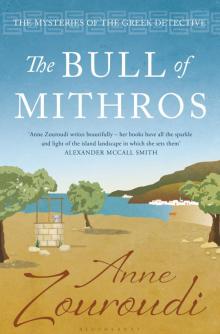 The Bull of Mithros
The Bull of Mithros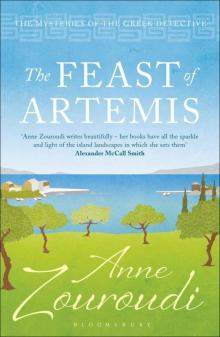 The Feast of Artemis (Mysteries of/Greek Detective 7)
The Feast of Artemis (Mysteries of/Greek Detective 7)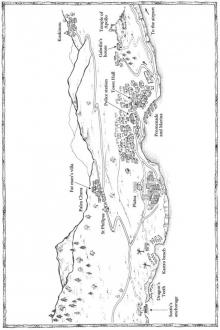 The Taint of Midas
The Taint of Midas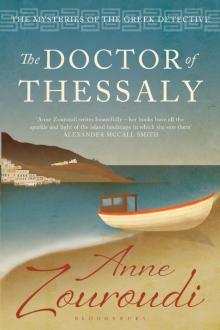 The Doctor of Thessaly
The Doctor of Thessaly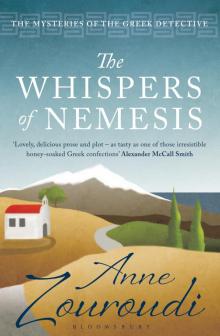 The Whispers of Nemesis
The Whispers of Nemesis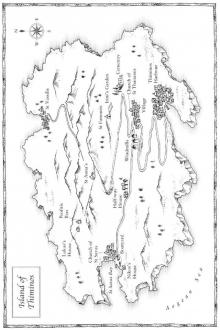 The Messenger of Athens
The Messenger of Athens